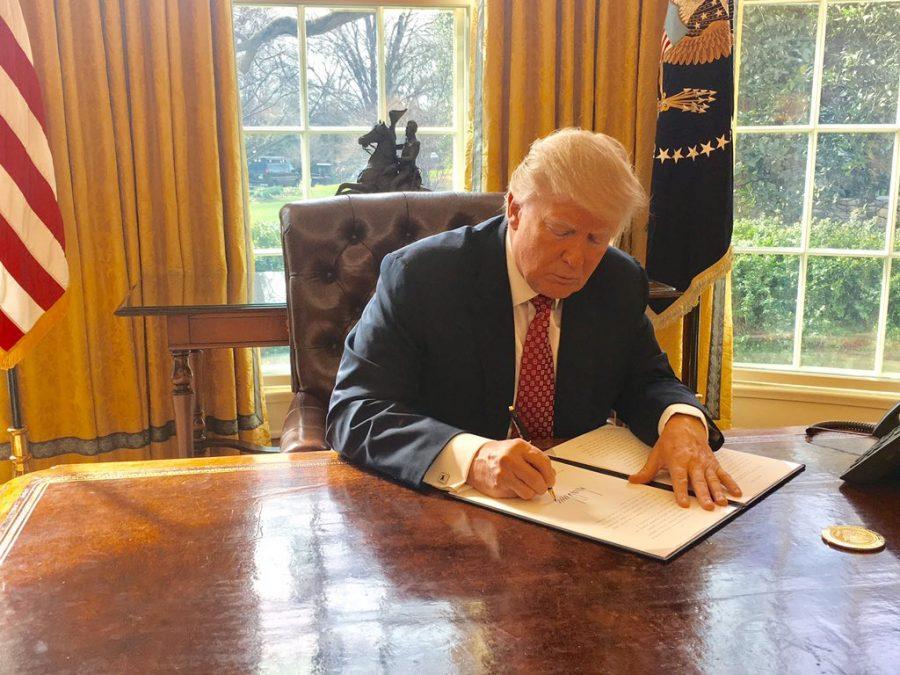Capitol Hill: What You Missed (Volume 18, Issue 6)
Courtesy of Wikimedia Commons
Trump signs an executive order. He has continued to sign and update executive orders since their initial implementations.
March 28, 2017
Since President Trump’s inauguration, he has signed over 15 executive orders, implementing new policies indicative of the direction his administration is going and will go. While his immigration executive order that banned immigrants from seven different countries and was later rescinded has received the most attention, here are some more of his most recent orders.
Presidential Executive Order on Enforcing the Regulatory Reform Agenda
Trump signed the executive order on Feb. 24, which ordered the head of each federal agency to designate an official as its Regulatory Reform Officer within 60 days. These officers would monitor reform policies from previous executive orders within their agency and ensure they are carried out properly.
“I’m not sure how it will work. There a lot of regulations are required by statute, so I’m not sure if the president has authority in this domain,” debater Kevin Xu (11) said. “Also, a lot of regulations are put in place by independent commissions.”
Presidential Executive Order on Restoring the Rule of Law, Federalism, and Economic Growth by Reviewing the “Waters of the United States” Rule
This executive order signed on Feb. 28 directed EPA administrator Scott Pruitt and the assistant secretary of the army for civil works to review President Obama’s 2015 Clean Water Rule. The Clean Water Rule extended federal protection to smaller rivers and streams in order to limit water pollution and gives protection to 60 percent of the US’s bodies of water. This is the first step by the new administration to potentially revise or rescind parts of the Clean Water Rule.
“President Trump’s action today endangers all who depend on clean water, which is every single person and business in the country,” Executive Director Marc Yaggi of Waterkeeper Alliance, an advocacy group for clean water, said in a press release. “Public health and our economy suffer when polluters discharge untreated sewage and industrial waste into any of our nation’s waters, including wetlands, streams, lakes, and rivers. Waterkeeper Alliance will fight every effort to destroy these longstanding clean water protections.”
Presidential Executive Order on The White House Initiative to Promote Excellence and Innovation at Historically Black Colleges and Universities
Trump signed this executive order on Feb. 28 acknowledging the important role of historically black colleges and universities (HBCUs) and to provide more support for these institutions by increasing the private-sector role and “enhancing HBCUs’ capabilities to serve our Nation’s young adults.” The order also establishes a board of advisors in the Department of Education that will advise the President on ways to improve HBCUs.
“President Trump’s Executive Order issued today is a significant and a positive first step in what we hope to be a productive working relationship,” Johnny C. Taylor Jr., president and CEO of the Thurgood Marshall College Fund, said in a statement. “We look forward to working with the Executive Branch and the Legislative Branch to ensure the President’s funding requests and the subsequent budget approved by Congress put the necessary resources into black colleges so they can continue doing the important work America needs them to do.”
Executive Order Protecting The Nation From Foreign Terrorist Entry Into The United States
Trump signed a new immigration ban on March 6, overriding the previous one signed on Jan. 27, which implemented a 90 day ban on immigrants from seven Middle East countries. The new order suspends immigrants entries for 90 days still, but now only applies to six countries and immigrants who did not obtain a visa before Jan. 27. The order also aims to decrease the number of new refugee entries to 50,000 this year. While the new ban is more watered down from the initial one, Democrats still criticize it for discriminating based on religion, and more than 20 lawsuits have been filed in response to the signing.
“I think it’s making people not want to come to the United States because it’s not clear how things will go at the airport and what it will be like in the cities,” upper school European History teacher Byron Stevens said. “[There are] potentially unconstitutional things that it’s doing in terms of identifying a certain group of people, whether [] or not. But I think, like a lot of the proposals, it is attempting to score political points by solving a problem that isn’t really a problem.
This piece was originally published in the pages of The Winged Post on March 28, 2017.




![LALC Vice President of External Affairs Raeanne Li (11) explains the International Phonetic Alphabet to attendees. "We decided to have more fun topics this year instead of just talking about the same things every year so our older members can also [enjoy],” Raeanne said.](https://harkeraquila.com/wp-content/uploads/2025/10/DSC_4627-1200x795.jpg)


















![“[Building nerf blasters] became this outlet of creativity for me that hasn't been matched by anything else. The process [of] making a build complete to your desire is such a painstakingly difficult process, but I've had to learn from [the skills needed from] soldering to proper painting. There's so many different options for everything, if you think about it, it exists. The best part is [that] if it doesn't exist, you can build it yourself," Ishaan Parate said.](https://harkeraquila.com/wp-content/uploads/2022/08/DSC_8149-900x604.jpg)




![“When I came into high school, I was ready to be a follower. But DECA was a game changer for me. It helped me overcome my fear of public speaking, and it's played such a major role in who I've become today. To be able to successfully lead a chapter of 150 students, an officer team and be one of the upperclassmen I once really admired is something I'm [really] proud of,” Anvitha Tummala ('21) said.](https://harkeraquila.com/wp-content/uploads/2021/07/Screen-Shot-2021-07-25-at-9.50.05-AM-900x594.png)







![“I think getting up in the morning and having a sense of purpose [is exciting]. I think without a certain amount of drive, life is kind of obsolete and mundane, and I think having that every single day is what makes each day unique and kind of makes life exciting,” Neymika Jain (12) said.](https://harkeraquila.com/wp-content/uploads/2017/06/Screen-Shot-2017-06-03-at-4.54.16-PM.png)








![“My slogan is ‘slow feet, don’t eat, and I’m hungry.’ You need to run fast to get where you are–you aren't going to get those championships if you aren't fast,” Angel Cervantes (12) said. “I want to do well in school on my tests and in track and win championships for my team. I live by that, [and] I can do that anywhere: in the classroom or on the field.”](https://harkeraquila.com/wp-content/uploads/2018/06/DSC5146-900x601.jpg)
![“[Volleyball has] taught me how to fall correctly, and another thing it taught is that you don’t have to be the best at something to be good at it. If you just hit the ball in a smart way, then it still scores points and you’re good at it. You could be a background player and still make a much bigger impact on the team than you would think,” Anya Gert (’20) said.](https://harkeraquila.com/wp-content/uploads/2020/06/AnnaGert_JinTuan_HoHPhotoEdited-600x900.jpeg)

![“I'm not nearly there yet, but [my confidence has] definitely been getting better since I was pretty shy and timid coming into Harker my freshman year. I know that there's a lot of people that are really confident in what they do, and I really admire them. Everyone's so driven and that has really pushed me to kind of try to find my own place in high school and be more confident,” Alyssa Huang (’20) said.](https://harkeraquila.com/wp-content/uploads/2020/06/AlyssaHuang_EmilyChen_HoHPhoto-900x749.jpeg)











